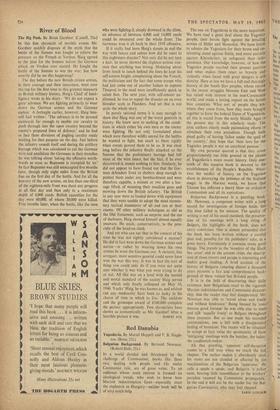River of Blood
The Big Push. By Brian Gardner. (Cassell, 21s.) iN this fine chronicle of terrible events Mr. Gardner quickly disposes of the myth that the battle of the Somme was fought to relieve the pressure on the French at Verdun. Haig agreed to the plan for the Somme before the German attack on Verdun ever started. He fought the battle of the Somme to win the war; but how exactly did he see this happening?
The day before the new British citizen armies, in their courage and their innocence, went over the top for the first time to this greatest massacre in British military history, Haig's Chief of Intel- ligence wrote in his diary: 'We do not expect a great advance. We are fighting primarily to wear down the German armies and the German nation.' A fortnight earlier, however, Haig him- self had written: 'The advance is to be pressed eastwards far enough to enable our cavalry to push through into the open country beyond the enemy's prepared lines of defence,' and he had in fact three divisions of jingling cavalry ready waiting for that purpose on the day. Just before the infantry assault itself and during the artillery barrage which was calculated to cut the German wire and annihilate the Germans in their trenches be was talking about 'taking the offensive north- wards as soon as Bapaume is occupied by us.' In fact Bapaume was still unoccupied five months later, though only eight miles from the British line on the first day of the battle. And for all the bravery of the new armies, on less than one-third of the eighteen-mile front was there any progress at all that day and then only to a maximum depth of 4,000 yards. British casualties for the day were 60,000, of whom 20,000 were killed. Five months later, when the battle, like the men who were fighting it, simply drowned in the slime, an advance of between 4,000 and 14,000 yards could be measured over the whole front. The Germans won it all back in their 1918 offensive. If it really had been Haig's dream to end.the war with lances and sabres how did he react to this nightmare disaster? Not only did he not turn a hair; he never showed the slightest serious con- cern that anything was wrong. Motoring about from lunch to lunch behind the lines he kept his self-esteem bright, complaining about the French, the politicians and the fact that some troops who had just come out of another failure to capture Thiepval in the mud were insufficiently quick to salute him. The next year, with self-esteem un- dimmed, he was to repeat the disaster on an even bloodier scale in Flanders. And yet that is not quite the whole story.
In purely rational terms it is easy enough to show that Haig was one of the worst generals in
history. He knew next to nothing of the condi- tions in which either his own men or the enemy were fighting. He not only formulated plans which were therefore wildly unreal for the battles he wanted to fight, but stuck to them rigidly when events proved them to be so. It was clear long before the infantry finally attacked on the Somme that the preliminary barrage had left most of the wire intact, but the fact, if he ever discovered it, meant nothing to him. Similarly, he did not appear to have found out that the Ger- man defenders lived in shelters deep enough to protect them under any bombardment and were therefore capable, a minute or two after a bar- rage lifted, of manning their machine guns and mowing down the British infantry. The British in any case were so loaded down with equipment that they were unable to adopt the most elemen- tary tactical manoeuvre of all and run at their enemy. Of other military techniques as old as the Old Testament, such as surprise and the use of darkness, Haig showed himself almost equally unaware. He stuck, conservatively, to the prin- ciple of the head-on clash.
And yet who can say that in the context of his time he was not rightly considered a success? He did in fact wear down the German armies and nation—or rather by wearing down his own armies he wore the Germans out. A cleverer, less arrogant, more sensitive general could never have won the war this way. It was in fact the sort of thing you could only do if you were not quite sure whether it was what you were trying to do or not. All this was on 'a level with the mental and moral standard of the society Haig served and which only finally collapsed on May 10, 1940. 'Lucky' Haig, he was known as, and seldom can any mediocrity have been so lucky in his choice of time in which to live. The earldom and the grotesque award of £100,000 complete the picture appropriately. Few chroniclers have shown as economically as Mr. Gardner what a






































 Previous page
Previous page